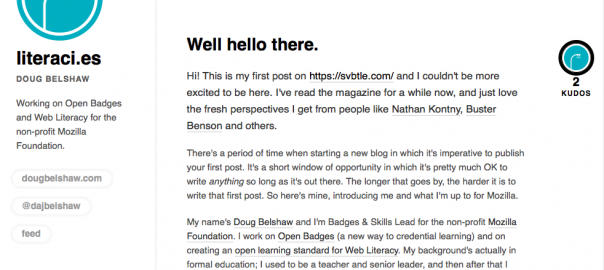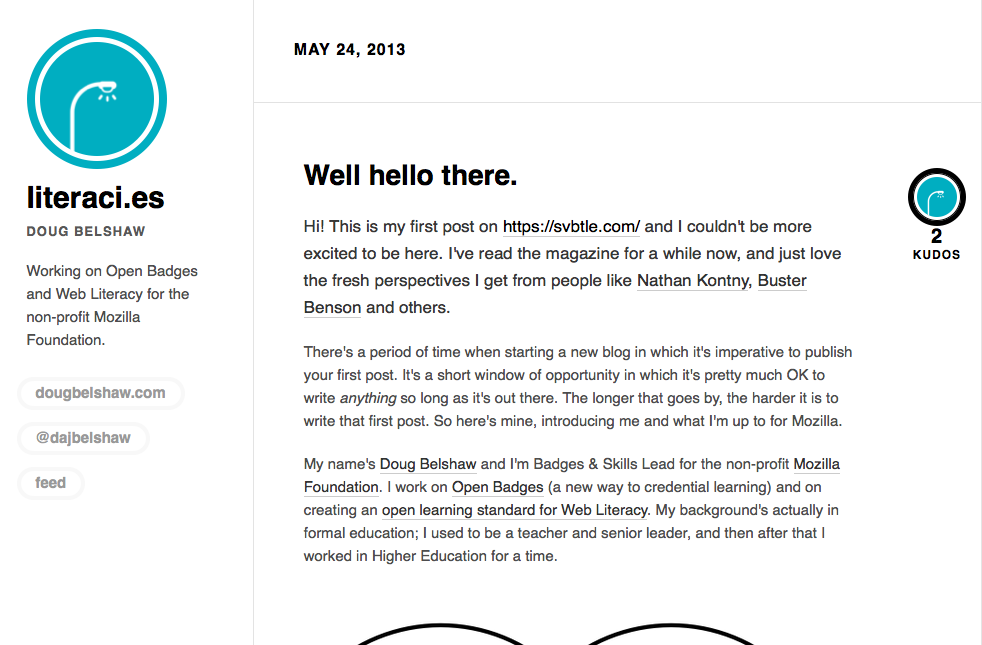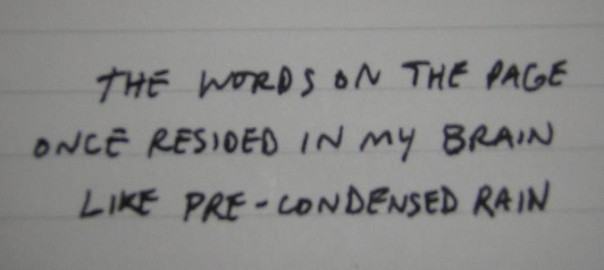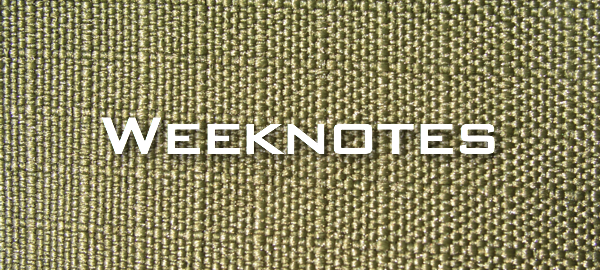One of the best ways to help people understand something they’ve not come across before is through metaphor and analogy.
A year or so ago, for example, my son had a cold and said “my nose is deaf” – and I knew exactly what he meant. It contained just the right balance of ambiguity.* When explaining Open Badges to people I’ve found “X is kind of like Y because of Z” helpful in getting them to grasp what I mean. The more useful metaphors, similes and analogies I can find, therefore, the better.
Below are some I’ve used recently to explain Open Badges. They may or may not help you or the people you’re talking to about badges. But give them a read and tell me what you think. Oh, and the animated GIFs are just for fun! 😉
The difference between ‘a badge’ and ‘a badge system’
Mozilla is developing the OBI – the Open Badges Infrastructure. People are free to use it to create their own badges for whatever purpose they like.

It’s a bit like a water company providing the infrastructure so that instead of having to go to a well, you can get water coming out of a tap. What you use that water for, what you mix it with, and how you share it is entirely up to you.
A different analogy might be that a badge is akin to an ‘app’ in an app store. Mozilla may produce some badges of its own, but it’s looking after the entire ‘app store’ in terms of the OBI. This metaphor breaks down for two reasons, however: there’s no one place to see all of the badges (at present) and it’s not a walled garden as many app stores are. Anyone can use badges for any purpose without reference to Mozilla. It’s an open, decentralised system and standard.
Metadata in badges
Metadata is data about data. It’s like when you tag someone in a photo on Facebook – you’re adding data about the data already in the system. In this case the data is the photograph and the metadata you’re adding is the name of an individual in the photo. The index at the back of a book is metadata as well – data about the data in the book.

One way to think about Open Badges is that they’re a bit like barcodes that can be understood by humans. Just as when you scan a barcode you get extra data such as the price of a product, so when clicking a badge you get details of what the earner had to do to get the badge, the evidence for it, etc.
The metadata is hard-coded into the Open Badge. So, just like when you make a cake, it’s made up of lots of different ingredients (the name of the badge, the identity of the badge earner, the Criteria URL, etc.). Once you’ve baked the cake or the badge, you can’t change those ingredients or get them out. That badge is unique to the individual. If you’ve baked a chocolate cake and now you want a Victoria sponge, then you’re going to have to bake another cake. Similarly, you can’t change a badge once it’s been issued.**
Badge pathways
In life, some pathways and routes definitely lead somewhere. That could be a route into employment, a journey to a holiday destination, or some other ‘place’ that you want to get to. There are almost-guaranteed ways to get to that destination, such as going to a travel agent and getting them to take care of your flight, transfers and accommodation. Likewise, completing a recognised project management qualification greatly increases the chances of being employed as a project manager.

There are other ways of getting to your holiday destination and becoming a project manager, however. You could book all of the different parts of the trip yourself. You could hitch-hike. You could use websites like Couchsurfing or Airbnb. Likewise, with the project manager position you could have learned how to manage projects on the job and have lots of experience of delivering successfully. Or, indeed, you may have transferable skills.
But there are some people for whom the journey is the destination. They don’t have a particular path in mind – or, perhaps, they’re blazing a new trail unsure of where it will lead. Being able to capture the knowledge, experience and skills they gain along the way would seem to be a useful thing to do. It surfaces the slightly meandering journey that I think we’ve all experienced during our careers. Badges can help validate these non-linear pathways.
Badge quality
Think of the last time you stayed in a hotel. Unless that was booked on your behalf, how did you end up staying where you did? Some of it may have been down to money, but what other factors were involved? There would have been the 5-star rating system which, until recently, would have been one of the only ways to ascertain the quality of a hotel. But is that the only thing you used? I bet, nine times out of ten, it was either TripAdvisor or some other social ratings/recommendation system.

The value of an Open Badge comes from at least from three different places. First, there’s the reputation of the individual or organisation that issues (or, in future, endorses) the badge. Second, there’s the (essential) Criteria URL in the badge that tells the consumer what the earner of the badge had to do to get it. And, finally, there’s the (optional) Evidence URL that shows just what the earner did with that criteria. It’s a triangulation very much akin to deciding which hotel to stay at: the star rating, a description of the facilities/amenities, and reviews from sites like TripAdvisor.
The point here is that top-down ‘quality’ systems can work, but they’re even more powerful (and can sometimes be replaced) by horizontal, peer-to-peer recommendation engines. It’s the difference between how a system should work and how it actually works.
Badge equivalency
Deciding that one thing is equivalent to another is not something that Mozilla is (at the moment, at least) concerned with.

I think of badge equivalency as being a bit like mobile phone tariffs. There’s many different plans and tariffs that it’s possible to use/sign up for as a mobile phone user. Most of them offer fairly similar combinations of talktime minutes, SMS messages and 3G data. Some, however, may offer 4G data. Even if there are differences between providers, it’s still possible to weigh up what’s best for you. What you decide to be ‘equivalent’ might not be the same as what someone else believes to be so. It depends upon context.
There will potentially be many different providers of similar badges. The value of the badge will be ascertained by employers and other people providing opportunities by comparing those badges against the others available. Credentials are always used for a purpose, after all. Eventually, some kind of ‘BadgeRank’ algorithm (similar to Google’s ‘PageRank’) may help both earners and employers find the most relevant badges in their industry.
Badge backpacks
Badges are hosted in a badge backpack and then displayed across the Web. It’s similar to videos being stored on YouTube or Vimeo and being embedded on many different websites. Likewise, you can make them private or public. The difference here is that, once we’ve got federated badge backpacks, you will get to choose where your ‘videos’ (badges) are hosted as well as where they’re embedded.

Some of these work better than others. I’d very much appreciate feedback as well as any analogies you’ve used successfully! 🙂
* More about different types of ambiguity in this paper that I (co-)wrote.
** So, technically, we are thinking very carefully about badge revocation but we don’t want people reaching into people’s badge backpacks willy-nilly and changing them. There possibly will be a ‘nuclear’ option for revocation, however – such as when you’ve accidentally awarded a PhD-level badge to a six year-old…
Image CC BY-NC-SA howard.hall










